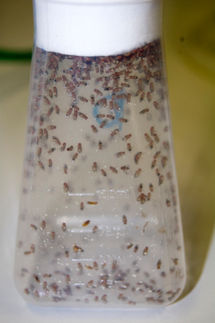Cancer geneticist Janet Davison Rowley to receive $500,000 Gruber genetics prize
Advertisement
Janet Davison Rowley, MD, a founder in the field of cancer cytogenetics, will receive the 2009 genetics Prize of The Peter and Patricia Gruber Foundation. She is being honored with the prestigious international award for discoveries of recurrent chromosomal abnormalities in leukemias and lymphomas — discoveries that have revolutionized how cancer is understood and treated. Currently the Blum-Riese Distinguished Service Professor at the University of Chicago, Rowley is also being honored for her critical national and international leadership in the biomedical research community. The Prize will be presented in Honolulu, Hawaii, on October 23 at the 59th Annual Meeting of the American Society of Human Genetics.
"Janet Rowley's work established that cancer is a genetic disease," says Mary-Claire King, a geneticist at the University of Washington. "She demonstrated that mutations in critical genes lead to specific forms of leukemia and lymphoma, and that one can determine the form of cancer present in a patient directly from the cancer's genes. We are still working from her paradigm."
Before Rowley began investigations into the chromosomal abnormalities of leukemia at the University of Chicago in the 1960s, few scientists believed that chromosomal aberrations caused tumors. The established view at the time was that abnormal chromosomes were manifestations of the generalized chaos that exists within leukemia and lymphoma cells. But Rowley believed something else was going on with those damaged pieces of DNA, and diligently pursued their study.
In the end, though, Rowley proved to be astonishingly prescient. Over the next decade, she made a number of remarkable discoveries, including the landmark finding that the abnormally short "Philadelphia" chromosome that had earlier been identified in hematopoietic cells of people with chronic myelogenous leukemia (CML) was not a chromosome deletion, as many scientists had thought, but an exchange (translocation) of segments between two chromosomes. She soon uncovered translocations in other types of leukemia and lymphoma cells, and then, as new technology became available, began to clone the translocation abnormalities, or breakpoints, of these chromosomes and to identify their oncogenes (the mutated genes that help transform a normal cell into a cancerous one). By 1980, she had redefined the field of cancer cytogenetics.
Rowley's research continues at her lab at the University of Chicago, the institution where she received her undergraduate and medical degrees six decades ago and where she has inspired and generously mentored countless students and postgraduate fellows during the ensuing years. Cancer cytogenetics continues to fascinate — and challenge — her. "We're still working on the leukemias," she says. "There's a lot of evidence that translocations and other chromosome abnormalities aren't sufficient to make a cell malignant. We're looking for the other mechanisms involved."

























































